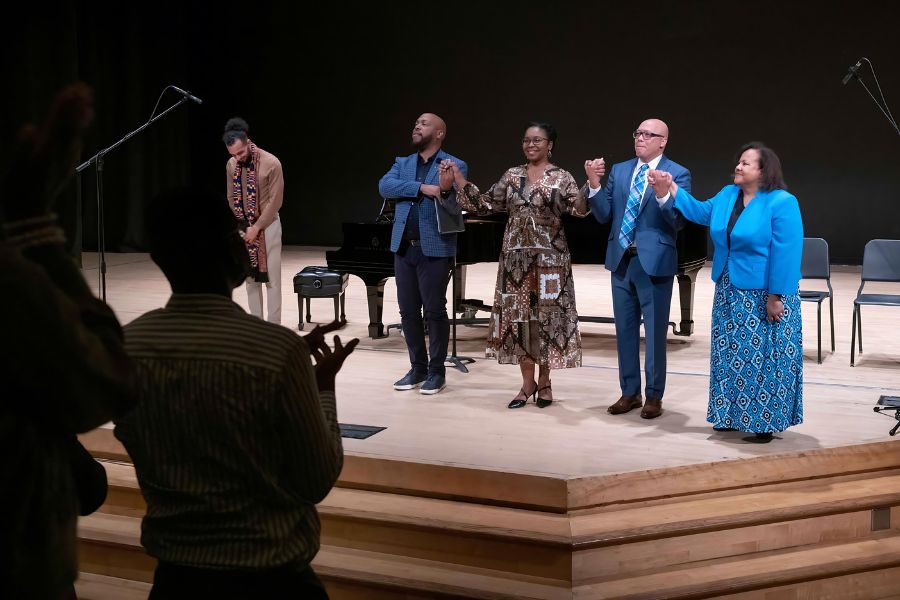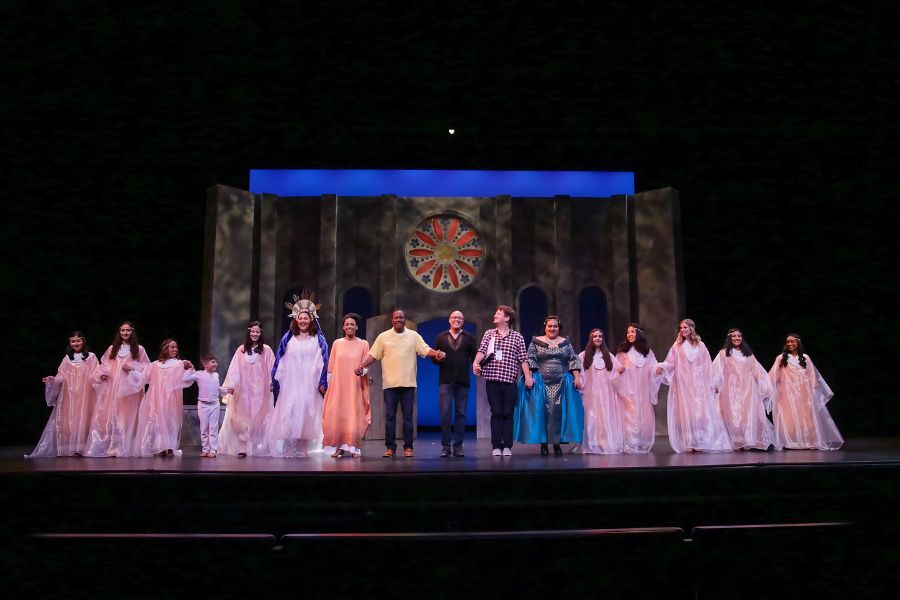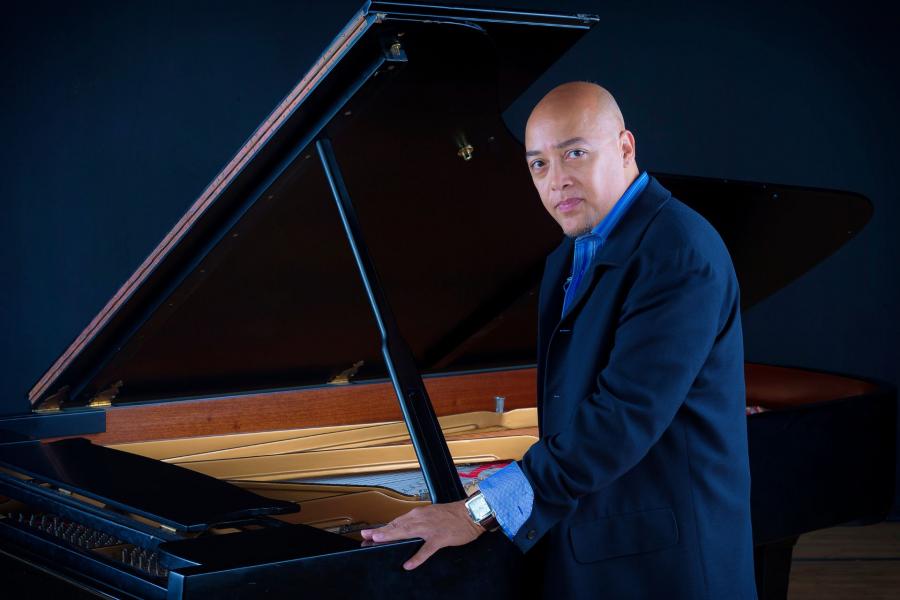A Life of Song
Exploring Professor Darryl Taylor's Influence on African American Music: A Q&A session
In July, Professor Darryl Taylor from the Department of Music at the Claire Trevor School of the Arts will receive an honor from the National Association of Negro Musicians, Inc. (NANM). Commemorating its centenary in 2019, NANM is dedicated to promoting, preserving and celebrating all genres of music created or performed by African Americans.
This accolade recognizes Taylor's remarkable achievements in music, his dedication to social service and the significant impact of his organization, the African American Art Song Alliance. Through this alliance, Darryl Taylor continues to elevate the contributions of African Americans from the Art Song genre, whether as composers, performers or scholars.
Q: Congratulations on your award. What does receiving recognition from NANM mean to you?
Darryl Taylor (DT): Anytime you have an organization with the word “Negro” in its name, it means it's a historic organization. NANM has been around since 1919 and their first scholarship recipient was Marian Anderson. Being recognized by such a historic organization carries the weight of that history. It's an acknowledgment of the caliber of individuals they've honored and the significance of being acknowledged by a community I've worked hard to support.
Q: As the founder of the African American Art Song Alliance, what inspired you to start this organization, and what are its primary goals?
DT: When I was at the University of Michigan, three principal players greatly influenced me. One was Willis Patterson, who compiled the first anthology of art songs by Black American composers. I did an independent study with him I wrote a 30-page paper about the importance of studying African American art song. He was impressed and suggested that I submit it for publication to the National Association of Teachers of Singing (NATS). They recommended including an appendix listing composers, dates, and publisher information. This appendix sparked the genesis of the alliance.
The second part of this journey involved George Shirley, the first to truly support my interest in works by Black composers. He provided me invaluable access and connections, allowing me to reach out to composers like Leslie Adams.
Lastly, Louise Toppin, a doctoral student at the time, offered generous access to Patterson's files, showing genuine support and encouragement. Over time, Louise and I realized our shared passion and decided to join forces, establishing the Alliance to uphold standards and ensure excellence in performing this repertoire. Our commitment to excellence has been the cornerstone of the Alliance for over 30 years.

Image: The African American Art Song Alliance, led by Professor Darryl Taylor (second from right) presented their 25th Anniversary conference at the Claire Trevor School of the Arts. (Photo: Steve Zylius/UC Irvine)
Q: How do you approach performing diverse genres and styles of music?
DT: Fortunately, I was raised in Detroit, Michigan, and Detroit is a musical city with a broad palette of colors and flavors. Where I was raised, every church had a lot of great singers. When that body of people would come together, it was truly impressive. You’d hear things ranging from opera, gospel, blues and everything in between.
My journey into classical music awakened a quality of artistry in the person that I was and gave me an opportunity to look at music that was not easily accessible. Whether it was contemporary music, quoted music by women or by people that ethnically were kept in the margins of the western classical canon. Influences like George Shirley played a significant role in shaping my approach and encouraging me to embrace diverse styles.

Image: Taylor (center) served as the Artistic Director for the Department of Music's production of Puccini’s "Suor Angelica" in 2018 at the Irvine Barclay Theatre. (Photo: Skye Schmidt Varga)
Q: You've introduced audiences to many works by African American composers. How do you select pieces to perform, and why is it important to highlight these composers?
DT: Throughout my career, I've looked up to senior composers, seeking to understand their styles firsthand. For my initial professional recording, I delved into Leslie Adams' work, realizing its underrepresentation, and aiming to make a lasting impact. As I've progressed in academia and the professional sphere, I've felt a responsibility to not only engage with established composers but also uplift emerging talents and women composers. It's vital to recognize excellence regardless of background. Our goal at the alliance is broader acceptance based on merit, ensuring that exceptional works stand out for their quality, not just their niche.
Image: Photo courtesy of Taylor
Q: How do you think the landscape for African American artists in classical music has evolved?
DT: When I was starting out, the most common and expected opportunity for African American singers was in Porgy and Bess. For many African American singers, both domestic and international, it served as a segue into the industry. Today, thanks in part to the efforts of the Alliance and others, the landscape has shifted dramatically. There's a plethora of possibilities and roles available.
The presence of African American artists in the Academy of Recording Arts and Sciences has exploded because of several shows winning or being nominated for Grammys. We are now in a time where you can have productions like Fire Shut Up in My Bones, Champion, Omar, Central Park Five and Malcolm X happening simultaneously. It's unprecedented and a completely different landscape.
Now, of course we don't want Black performers to be pigeonholed into specific roles, but these productions are potent opportunities for introduction to major companies.
Q: As a mentor to students, what key messages do you aim to impart to young musicians and vocalists?
DT: In my masterclasses around the country, and particularly with younger talent, I begin by saying your career begins when you start to take yourself seriously. There's no magical milestone, like finishing studies or landing a big contract that signals the start.
Approaching one's craft with earnestness and depth sets the stage for future success. It's about recognizing the significance of every practice session, every performance opportunity and every moment spent honing your skills.
Personal accountability is another cornerstone I emphasize. Asking questions and seeking guidance isn't a burden; it means you are ready for the answers. When those questions are presented, then we can have serious conversations. As someone deeply invested in nurturing talent, I love those discussions.

Image: Taylor instructs Nivi Saishankar during a vocal arts class in Winifred Smith Hall. (Photo: Skye Schmidt Varga)
Q: Can you share a memorable or transformative performance from your career?
DT: Performing a production of Orfeo ed Euridice in the Netherlands was an unforgettable experience. It was over 20 outdoor performances were staged on a lake, drawing an aggregate of approximately 70,000 audience members. It was undoubtedly one of the most impactful endeavors I've undertaken. The scale of the production was immense, with elaborate sets and unforgettable moments —
like walking into the lake only to have it set on fire. Another significant challenge was preparing for Akhnaten by Philip Glass in just a week. It was an intense period of hard work, pushing myself to the limit, with my mind feeling like it was burning from cramming so much in there all at once.
Q: What are your future projects or aspirations in your career?
DT: I have a couple of significant recordings releasing this year. One is a two-disc recording with Louise Toppin, featuring a vast collection of African American art songs and chamber music pieces. Additionally, I'm part of an oratorio called Crease Deuce by Dion Price, which I sang for as a senior at USC. This oratorio was recently recorded after an oral tutorial at the Mormon Tabernacle in Salt
Lake City, Utah. Alongside these recordings, I'm also performing with various orchestras and giving song recitals, but these are the major highlights.
To learn more about Darryl Taylor, visit visit his faculty bio at music.arts.uci.edu/faculty/darryl-taylor.
To learn more about the National Association of Negro Musicians, Inc. (NANM), visit their website at www.nanm.org/.


